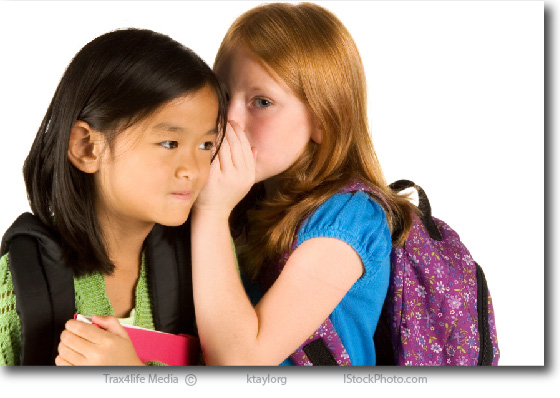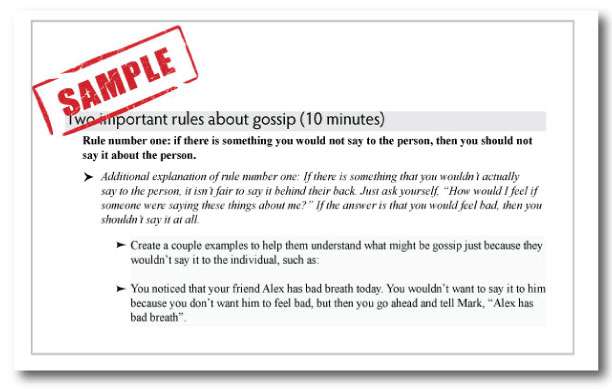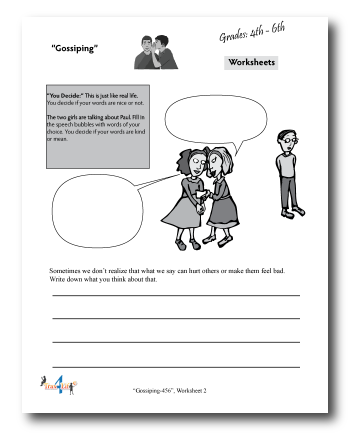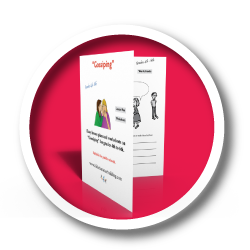Character Education lesson plan on gossiping for grades 4th to 6th

Introduction: Gossip or Not Gossip? (10-15 minutes)
Have students write “gossip” on the top left of a paper and “not gossip” on the top right, creating two columns.
Read out scenarios and have students mark the scenario in the “gossip” or “not gossip” section depending on how they see the scenario.
-
Scenario 1: Alicia is the new girl at school. She is rather quiet and hasn’t made any friends yet. When paired up with Tina for a school project, Alicia thought it would be a great opportunity to make a friend. As they worked on their science project together, Alicia told Tina that she is new to the city, having moved there with her mother after her parents got divorced. On the bus ride home, Tina tells her best friend, Carly, all that she could remember from her conversation with Alicia.
-
Scenario 2: Steven was focused on his exam when he noticed Andrew, who sat in front of him, was moving around a lot. He looked more closely and noticed that Andrew kept looking at things written on his leg whenever the teacher wasn’t looking their way. Steven stayed a few moments after class so that he could tell the teacher what he had seen.
-
Scenario 3: Annabelle enjoyed her ballet classes after school and had been taking ballet classes for a couple of years. Her classmate Sarah just began taking ballet classes too and joined in on the same class as Annabelle. Sarah was having a rough start, as she had never studied ballet before. It was difficult for her to manage a lot of the positions. Her teacher encouraged her that she was off to a good start and that it would take some time to learn the different motions. The next day at school, a few students walked up to Sarah, and said she danced like a monkey and shouldn’t embarrass herself any more. Annabelle was watching with a smile from the other side of the room.
-
Scenario 4: Francis was walking home when he saw Angel half a block ahead of him. She held a big stack of books and he knew that her home was another four blocks away. He ran up and offered to help her carry the books home. Chris, Angel’s brother, opened the door when they got home and saw Francis give the books back to Angel. He didn’t say anything, but the next day at school, when Francis walked into his classroom, some kids started giggling or making kissing sounds.
Go through scenarios again together, listening to students’ response as to whether it was gossip or not. Helps students define what gossip is, and how things they might see as “okay” to talk about are in fact gossip. Also bring out the point that it might seem sharing information is okay, but it might end up hurting someone if the information is passed on to someone who might use it in an unkind manner.

Definition of Gossip (10 minutes)
Let students call out their own synonyms or definitions to the word “gossip”. Write them down. Then read the following proper definitions and synonyms.
-
The American Heritage Dictionary defines gossip as: “rumor or talk of a personal, sensational, or intimate nature,” or “a person who habitually spreads intimate or private rumors or facts.”
-
World Book said gossip is: “idle talk, not always true, about other people and their affairs.”
-
Webster’s Dictionary listed it as: “a person who habitually reveals personal or sensational facts about others” or “a rumor or report of an intimate nature.”
-
The Expository Dictionary of Bible Words says: “A talebearer [is] one who rushes around telling stories. ‘Whisperer,’ or ‘babbler.’ The gossip whispers poisonous reports in someone’s ear in private that he or she would not dare to say in front of the person talked about.” The terms “false accuser,” “revealer of secrets” and “slanderer” are closely related … and show other aspects of gossiping.
-
Roget’s Thesaurus lists more of the negative aspects of gossip.
-
As a noun, it is described as follows:
-
Insubstantial thing: hot air, idle talk, speculation, rumor, empty talk.
-
Inquisitive person: busybody, meddler.
-
Informer: eavesdropper, tattletale, chatterer.
-
Rumor: hearsay, talk of the town.
-
Fable: claptrap, guff, bull, rumor.
-
Evildoer: slanderer, calumniator, detractor.
-
-
-
As a verb, it is described as follows:
-
Inform: spread rumors.
-
Speak: wag one’s tongue, rattle on, prattle, chatter.
-
Defame: speak ill of, speak evil, badmouth, make scandal, talk about, backbite, talk behind one’s back.
-

“Add or subtract” activity (10-15 minutes)
This is a variation of “Chinese whispers” [also called Grapevine, Broken Telephone, Whisper Down the Lane, or Gossip]. Organize students in a circle. Tell the first student a statement about yourself, such as “I went to a store yesterday”. Have the first student pass on that statement to the next student and either, 1) ask a question, 2) add another statement, or 3) subtract a statement.
-
The game will progress something like this:
-
1st student: Teacher went to the store yesterday. What store do you think he went to?
-
2nd student: Teacher went to a store yesterday. I think it was a store that sold alcohol.
-
3rd student: The teacher went to a liquor store last night!
-
4th student: Did you hear that our teacher buys liquor every night?
-
5th student: Our teacher is an alcoholic! He buys liquor every night. I wonder if he likes to party too?
-
6th student: Hey, I heard that our teacher is a partying alcoholic. He even got in trouble with the cops once.
-
-
This game is to portray that they might hear something exciting or sensational from someone else, but it could very well be that facts have been added, taken away, or embellished until the story they have heard is a far cry from what really happened. If they spread the story further, there is even more chance that the story will grow into something that is very far from the truth.
Two important rules about gossip (10 minutes)
Rule number one: if there is something you would not say to the person, then you should not say it about the person.
-
Additional explanation of rule number one: If there is something that you wouldn’t actually say to the person, it isn’t fair to say it behind their back. Just ask yourself, “How would I feel if someone were saying these things about me?” If the answer is that you would feel bad, then you shouldn’t say it at all.
-
Create a couple examples to help them understand what might be gossip just because they wouldn’t say it to the individual, such as:
-
You noticed that your friend Alex has bad breath today. You wouldn’t want to say it to him because you don’t want him to feel bad, but then you go ahead and tell Mark, “Alex has bad breath”.
-
Rule number two: “The golden rule”. It says that you need to treat others the way you want them to treat you. So if there was something you wouldn’t want someone to say about you, you wouldn’t say it about them.
-

-
Again, create an example, such as:
-
You were having relay races during P.E. You were teamed up with Felix for a three-legged race. You stumbled on a rock and tripped, which caused Felix to fall. After the race, you began saying to everyone how Felix was clumsy for falling, without mentioning the fact that you tripped, which caused him to stumble.
-
Application activity (15-20 minutes)
Come back to the definitions and synonyms (above). Write them a whiteboard or blackboard. You can also use the definitions that the students came up with. Divide students into small groups of three or four, and let them design a piece of work around the word they choose.
- Example: One group chooses “hot air”. They write a series of pictures likening gossip to a hot air balloon that gets more and more hot air until it floats into the sky where everyone can see it.
- Another group chooses “empty talk” and creates a skit manifesting empty talk, where people talk and talk but don’t say anything substantial.
- A third group chooses “spread rumors” and writes a short story or poem about the effects of spreading rumors.




